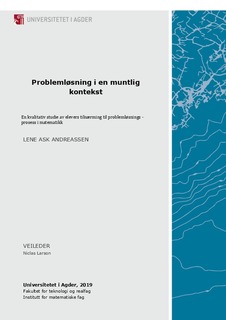| dc.contributor.author | Andreassen, Lene Ask | |
| dc.date.accessioned | 2019-10-22T08:16:57Z | |
| dc.date.available | 2019-10-22T08:16:57Z | |
| dc.date.issued | 2019 | |
| dc.identifier.uri | http://hdl.handle.net/11250/2623631 | |
| dc.description | Masteroppgave matematikkdidaktikk MA502 – Universitetet i Agder 2019 | nb_NO |
| dc.description.abstract | The theme and focus of this thesis has been to study which strategies students use in conversation based on a problem-solving task in mathematics, which is presented to the student, but also which mathematical competence they use in the solvingprocess. The following research questions have been the basis for this study; 1What strategies do students use in solving a problem solving tasks in mathematics? 2What importance does the student's mathematical competence have for the pupil'sparticipation in aproblem-solving process?The theoretical framework that underlies this study is the socio-cultural learning theory in which Vygotsky is central. Furthermore, research will be presented on problem solving and various problem-solving models, as well as research on strategies used in the problem-solving process. Research on mathematical competence and oral mathematics will also form the basis for the theory chapter.Own study is based on both observation and interview of students in an authentic mathematics lesson from one of the country's upper secondary schools. The empirical study of one's own study consists of the transcription of the conversations between the students in solving the problem-solving task and in addition the transcription of the conversationswhere I as theirteacher interviews some selected students after the solutionprocess.The results of the analysis of the study's empirical material showed a connection between the importance of the pupils competence and the studentsuse of strategies. The pupils mainly used these six different problem solving strategies; visual representations, definitions and notations, analogy, hypothesis and evidence, monitoring and logical reasoning.The study has not been interested in the chronology, so the strategies are not necessarily listed in the order in which they took place. The study recognized the problem-solving process as a cyclical process, where the student moves between the different phases of the process.Interesting questions for further research will be to study how the students organize the actual problem-solving process and how they talk about the solution. | nb_NO |
| dc.language.iso | nob | nb_NO |
| dc.publisher | Universitetet i Agder ; University of Agder | nb_NO |
| dc.rights | Attribution-NonCommercial-NoDerivatives 4.0 Internasjonal | * |
| dc.rights.uri | http://creativecommons.org/licenses/by-nc-nd/4.0/deed.no | * |
| dc.subject | MA502 | nb_NO |
| dc.title | Problemløsning i en muntlig kontekst : En kvalitativ studie av elevers tilnærming til problemløsnings-prosess i matematikk | nb_NO |
| dc.type | Master thesis | nb_NO |
| dc.subject.nsi | VDP::Samfunnsvitenskap: 200::Pedagogiske fag: 280::Fagdidaktikk: 283 | nb_NO |
| dc.source.pagenumber | 99 s. | nb_NO |

